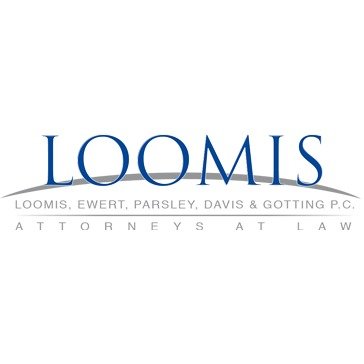Best Tax Increment Financing Lawyers in Lansing
Share your needs with us, get contacted by law firms.
Free. Takes 2 min.
List of the best lawyers in Lansing, United States
About Tax Increment Financing Law in Lansing, United States
Tax Increment Financing (TIF) is a public financing method that is used as a subsidy for redevelopment, infrastructure, and other community-improvement projects in blighted or underdeveloped areas. In Lansing, United States, TIF is instrumental in promoting economic development by redirecting the future taxes generated from an increased property value within a TIF district towards necessary development costs. This mechanism enables the city to support projects that can stimulate growth, create jobs, and enhance the community without burdening taxpayers with immediate taxes.
Why You May Need a Lawyer
There are various scenarios in which individuals or businesses may need legal assistance in the realm of TIF. Common situations include:
- Navigating the complex application process for establishing or extracting benefits from a TIF district.
- Understanding the compliance and regulatory requirements tied to TIF awards.
- Resolving disputes or litigation related to TIF agreements or district implementations.
- Providing legal counsel on financial obligations and ramifications of participating in a TIF-funded project.
- Assisting municipalities or community organizations in forming partnerships or joint ventures for TIF projects.
Local Laws Overview
In Lansing, the implementation and management of TIF districts are governed by both state and local regulations. Key aspects include:
- The criteria for determining a TIF district, usually areas in need of revitalization that meet specific developmental thresholds.
- The requirement for approval from Lansing's city council and public hearings before forming a TIF district.
- Allocation of incremental tax revenue exclusively for designated public improvements or subsidies stipulated in the TIF plan.
- Monitoring and reporting obligations to ensure the transparent use of funds and achievement of goals outlined in the TIF plan.
Frequently Asked Questions
What is a TIF district?
A TIF district is an area designated by a municipality where tax increment financing is used to spur development and infrastructure improvements.
How does TIF work in Lansing?
TIF in Lansing functions by capturing the future tax increment that is a result of increased property assessments within the TIF district and applying these funds to finance pre-approved projects.
Who can benefit from TIF?
Both the community-at-large and private developers can benefit from TIF. The community benefits from upgraded infrastructure and increased economic activity, while developers receive financial incentives to undertake projects that may otherwise be unfeasible.
Are there risks associated with TIF?
Yes, potential risks include over-reliance on anticipated tax increments that may not materialize if property values do not increase as expected.
What types of projects can be funded with TIF?
Projects eligible for TIF funding typically involve infrastructure improvements such as roads, utilities, parks, renovations, and other community-improving projects.
Can TIF be used for residential projects?
Yes, TIF can be used for residential projects, particularly those involving affordable housing or mixed-use developments that contribute to community welfare.
What is the duration of a TIF district?
The duration of a TIF district can vary, but it typically lasts around 20-30 years depending on the scope and goals of the project.
Do all TIF projects require city council approval?
Yes, all TIF plans must be approved by the local city council after public hearings and necessary evaluations.
Can TIF funds be used elsewhere once approved?
No, TIF funds must be used for their intended purpose as outlined in the TIF plan unless amendments are authorized through proper legal channels.
How is progress monitored in a TIF district?
Progress in a TIF district is monitored through regular reports and compliance checks to ensure projects meet objectives and legal spending requirements.
Additional Resources
For further information, individuals can consult resources such as the Lansing City Planning Department, the Michigan Economic Development Corporation, and local Chambers of Commerce. Additionally, engaging with organizations like Michigan Community Capital can provide insights into ongoing or prospective TIF projects.
Next Steps
If you require legal assistance with TIF, consider retaining an attorney specializing in municipal or public finance law. Start by gathering all relevant documentation and project proposals you may have. A seasoned lawyer can guide you through the complexities of TIF processes, help draft necessary legal documentation, and represent your interests in municipal forums. Contact the Michigan State Bar Association for referrals or use online legal service directories to locate experienced professionals in this field.
Lawzana helps you find the best lawyers and law firms in Lansing through a curated and pre-screened list of qualified legal professionals. Our platform offers rankings and detailed profiles of attorneys and law firms, allowing you to compare based on practice areas, including Tax Increment Financing, experience, and client feedback.
Each profile includes a description of the firm's areas of practice, client reviews, team members and partners, year of establishment, spoken languages, office locations, contact information, social media presence, and any published articles or resources. Most firms on our platform speak English and are experienced in both local and international legal matters.
Get a quote from top-rated law firms in Lansing, United States — quickly, securely, and without unnecessary hassle.
Disclaimer:
The information provided on this page is for general informational purposes only and does not constitute legal advice. While we strive to ensure the accuracy and relevance of the content, legal information may change over time, and interpretations of the law can vary. You should always consult with a qualified legal professional for advice specific to your situation.
We disclaim all liability for actions taken or not taken based on the content of this page. If you believe any information is incorrect or outdated, please contact us, and we will review and update it where appropriate.









